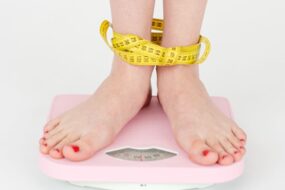
Losing weight can be a challenging journey. You’ll experience moments of triumph and times when you hit a roadblock. One of these roadblocks is known as a weight or lose fat loss plateau.
Table of Contents (click to expand)
Introduction
When you start losing weight, seeing those initial pounds disappear is often exciting. However, your progress may stall after a few weeks or months, even if you still eat healthy and exercise regularly. This is called a weight loss plateau, and it can be frustrating to experience. In this article, we’ll discuss how many weeks is considered a weight loss plateau, what causes them, and how to push past them to continue losing weight.
Related: When Do You Notice Weight Loss?
What is a Weight Loss Plateau?
A weight loss plateau is when your body stops losing weight despite continued efforts to lose weight through diet and exercise. It’s the dreaded weight plateau, a common occurrence when people try to lose weight, and it can happen to anyone regardless of their body type, age, or gender.
Causes of Weight Loss Plateaus
There are several reasons why weight loss plateaus happen, including:
- Caloric deficit: Eating fewer calories than your body needs creates a caloric deficit, leading to weight loss. However, over time, your body adjusts to the lower calorie intake, and your weight loss can slow down or stop altogether.
- Metabolic adaptation: Your body’s metabolism adjusts to meet your new weight, meaning that the more weight you lose, the fewer calories you burn daily. As a result, you may need to eat fewer calories or increase your physical activity to continue losing weight.
- Loss of muscle mass: When you lose weight, you may also lose lean muscle mass and body fat. Since muscle burns more calories than fat, losing muscle mass can slow your metabolism and lead to a plateau.
- Hormonal imbalances: Hormones play a critical role in weight loss, and imbalances can make it difficult to lose weight. For example, low levels of thyroid hormones can lower your metabolic rate, while high cortisol levels can lead to weight gain and belly fat.
- Inadequate sleep: Not getting enough restful sleep can interfere with your body’s ability to burn calories and regulate hormones that affect weight loss.
It can be discouraging when you hit a weight-loss plateau, but it’s important to remember that these weight loss plateau happen and are a natural part of the process.
How Common are Weight Loss Plateaus?
Weight loss plateaus are a common occurrence during the weight loss journey. One study found that nearly 80% of people who lost weight experienced a weight loss plateau at some point. The good news is that weight loss plateaus are not a sign that you’re doing something wrong, and they don’t mean you won’t be able to reach your weight loss goals.
How Much Time Is Considered a Weight Loss Plateau?
The duration of a weight loss, or weight plateau, can vary from person to person. Generally, a weight loss plateau is considered to occur when you haven’t lost any weight for two or more weeks, despite your continued efforts to lose weight. While this can be discouraging, it’s essential to understand that weight loss is not always linear and that plateaus are a normal part of the process.
Factors that Affect the Duration of a Weight Loss Plateau
Several factors can affect how long your weight loss plateau lasts, including:
- Current weight: If you’re already at a healthy weight, your body may resist losing more weight.
- Caloric intake: Eating too few calories for an extended period can slow down your metabolism and lead to a plateau.
- Exercise routine: Your body can adapt to the same exercise routine, leading to fewer calories burned during physical activity.
- Body composition: A higher percentage of body fat can make it easier to lose weight, while a higher rate of lean muscle mass can make it harder to lose weight.
- Fitness level: As you get fitter, your body becomes more efficient at using calories, which can lead to a plateau.
- Hormonal changes: Hormonal changes, such as menopause in women, can affect weight loss.
When to Be Concerned About a Weight Loss Plateau
While weight loss plateaus are expected, there are some instances when you should be concerned. Suppose you’ve been following a strict diet plan and exercise program and have not seen any weight loss for four or more weeks. In that case, it’s a good idea to consult a healthcare professional to rule out any underlying medical conditions hindering your weight loss progress.
Related: How to Raise Your Core Body Temperature for Weight Loss
Signs that You Have Hit a Weight Loss Plateau
Recognizing the signs of a weight loss plateau is essential to take the necessary steps to push past it. Here are some physical and emotional signs that you may have hit a weight loss plateau:
Physical Signs of a Weight Loss Plateau
- No change in weight: If you haven’t lost any weight for two or more weeks, despite sticking to your diet and exercise routine, it’s a sign that you’ve hit a plateau.
- Lack of energy: If you’re tired and sluggish, it could be a sign that your body is not getting enough power from your diet.
- Poor sleep: Not getting enough restful sleep can interfere with your body’s ability to lose weight.
- Reduced calorie burn: You may notice you burn fewer calories during physical activity, even if you’re doing the same workout.
Emotional Signs of a Weight Loss Plateau
- Frustration: Hitting a plateau can be frustrating, especially if you’ve been working hard to lose weight.
- Lack of motivation: When you’re not seeing results, staying motivated to continue with your weight loss journey can be challenging.
- Self-doubt: You may start to doubt yourself and wonder if you’re doing something wrong.
What to Do When You Hit a Weight Loss Plateau
Hitting a weight loss plateau doesn’t mean you’ll never lose weight again. You can use several strategies to break through or break a weight loss plateau and continue losing weight.
Strategies for Breaking Through a Weight Loss Plateau
- Increase physical activity: Increasing your workout intensity or adding strength training workouts can help you burn more calories and build lean muscle mass.
- Change your exercise routine: Doing the same daily workouts can lead to a plateau. Mix up your routine by trying new activities or increasing the frequency of your movements.
- Re-evaluate your calorie intake: If you’re eating too few calories, your metabolism can slow down, leading to a plateau. Try increasing your calorie intake slightly to see if that helps kickstart your weight loss.
- Reduce stress: High-stress levels can interfere with weight loss by raising cortisol levels. Try incorporating stress-reducing activities like meditation or yoga into your daily routine.
- Get enough sleep: Aim for at least 7-8 hours of restful sleep each night to help regulate hormones that affect weight loss.
Diet Changes to Overcome a Weight Loss Plateau
- Eat more protein: Protein is essential for building and repairing lean muscle mass, which can help increase your metabolism and break through a plateau. Aim for at least 1 gram of protein per pound of body weight daily.
- Cut back on processed foods: Processed foods are often high in calories and low in nutrients, making it harder to lose weight. Try focusing on whole, nutrient-dense foods instead.
- Track your food intake: Keeping a food diary or using a calorie-tracking app can help you stay accountable for your eating and adjust as needed.
- Try a low-carb diet: Low-carb diets are effective for weight loss and breaking through plateaus. Consider reducing your carbohydrate intake and increasing your intake of healthy fats and proteins.
Exercise Adjustments to Overcome a Weight Loss Plateau
- Increase the duration or intensity of your workouts: If you’ve been doing the same workouts for a while, try increasing the duration or intensity to challenge your body and burn more calories.
- Add strength training workouts: Strength training can help build lean muscle mass, increase metabolism, and break through a plateau. Incorporate strength training workouts into your routine at least twice a week.
- Try high-intensity interval training: HIIT workouts can help you burn more calories in less time by alternating between periods of high-intensity exercise and recovery periods.
Avoiding Weight Loss Plateaus
While weight loss plateaus are a normal part of the weight loss journey, there are some things you can do to prevent them from happening as often:
Related: How to Restart Weight Loss After Gastric Sleeve
Prevention Strategies for Weight Loss Plateaus
- Focus on sustainable weight loss practices: Crash diets and extreme workouts can lead to rapid weight loss, but they’re not sustainable and can lead to plateaus. Focus on making lifestyle changes that you can maintain over the long term.
- Incorporate strength training into your routine: Strength training helps build lean muscle mass, increasing your metabolism and preventing plateaus.
- Mix up your workouts: Doing the same daily exercises can lead to a plateau. Mix up your routine by trying new activities or increasing the frequency of your movements.
- Get enough restful sleep: Sleep is essential for regulating hormones affecting weight loss. Aim for at least 7-8 hours of restful sleep each night.
- Track your progress: Keeping track of your weight, body fat percentage, and measurements can help you stay motivated and adjust as needed.
- Incorporate healthy habits: Eating a balanced diet, getting enough physical activity, and reducing stress can all help prevent weight loss plateaus.
Common Myths About Weight Loss Plateaus
There are several myths about weight loss weight plateaus, and that can make it harder to break through them. Let’s take a look at some of these myths and debunk them:
Debunking Myths About Weight Loss Plateaus
- Myth: A plateau means you’re not losing body fat: While it’s true that a plateau can mean that you’re not losing weight or body fat, it doesn’t necessarily mean that you’re not making progress. You may still be losing inches or improving your overall body composition.
- Myth: You need to eat fewer calories to break through a plateau: While reducing your caloric intake can help you lose weight, eating too few calories for an extended period can slow your metabolism and lead to a plateau. Try increasing your caloric intake slightly or increasing your physical activity to break through a plateau.
- Myth: You need to stop strength training to lose weight: Strength training is essential for building lean muscle mass, which can increase your metabolism and help you burn more calories. Cutting back on strength training can make it harder to lose weight.
- Myth: You should cut out all carbs to lose weight: Carbohydrates are an essential macronutrient that provides your body with energy. Cutting out all carbs is not necessary or sustainable for most people. Instead, focus on incorporating healthy sources of carbohydrates like fruits, vegetables, and whole grains into your diet.
The Importance of Patience in Weight Loss
Weight loss is a journey, and it takes time to see results. It’s essential to have patience and realistic expectations regarding your weight loss plan.
Understanding the Process of Weight Loss
You may see rapid results when you first do an exercise plan and start losing weight. However, weight loss can slow down or stop altogether as your body adjusts to your new caloric intake and physical activity level. This is a normal part of the weight loss process, and it’s essential to understand that weight loss is not always linear.
Managing Expectations During Weight Loss
It’s essential to have realistic expectations when it comes to weight loss. While it’s possible to have a low-calorie diet and lose significant weight quickly, it’s not sustainable or healthy for most people. Aim for a healthy weight loss of 1-2 pounds per week.
Related: How to Use Ginger Oil for Weight Loss: A Comprehensive Guide
Benefits of Remaining Patient
Remaining patient during weight loss has several benefits. First, it can help you stay motivated and focused on your goals. Second, it allows your body to adjust to your new weight gradually, reducing the risk of regaining the same weight again later on. Finally, it helps you develop healthy habits you can maintain over the long term.
Reasons for Stalled Weight Loss
Losing weight is no easy feat, and hitting a plateau can be frustrating and demotivating. While it’s normal to experience a slowdown in weight loss progress, it’s important to identify the reasons behind it to avoid getting stuck in a rut.
Other reasons for stalled weight loss
Aside from hitting a plateau, there are other reasons why weight loss progress may stagnate. These include dehydration, stress, hormonal imbalances, and medication side effects. To combat these issues and stop losing weight again, stay hydrated, manage stress through relaxation techniques, see a healthcare professional for hormonal imbalances, and speak to a doctor about adjusting medications if necessary.
Medical conditions that could cause a weight loss plateau
Certain medical conditions can hinder weight loss progress. These include hypothyroidism, PCOS, and Cushing’s syndrome. Speaking to a healthcare professional to rule out any underlying medical conditions that could impact weight loss is crucial.
Celebrating Progress, Not Just Results
The importance of celebrating weight loss progress
While reaching a weight loss goal is an exciting achievement, it’s equally important to celebrate the progress made along the way. Recognizing milestones and progress can help keep motivation high and encourage continued effort toward weight loss goals.
How to measure progress beyond the scale
Focusing on non-scale victories can help measure progress beyond simply the number on the scale. These victories include improved energy levels, better sleep quality, increased strength and endurance, and improved confidence and self-esteem.
The Connection Between Sleep and Weight Loss
The Role of Sleep in weight loss
Sleep plays a critical role in the weight loss journey. Lack of sleep can impact hormone levels, leading to increased hunger and cravings and decreased metabolism.
How lack of sleep can hinder weight loss
When you don’t get enough sleep, your body produces more ghrelin (the hunger hormone) and less leptin (the satiety hormone), leading to increased appetite and overeating. Lack of sleep can also decrease basal metabolic rate and energy expenditure, leading to fewer calories burned throughout the day.
Tips for improving sleep quality
To improve sleep quality, try setting a consistent sleep schedule, avoiding caffeine and alcohol before bed, creating a relaxing bedtime routine, and limiting screen time before bed.
The Benefits of Strength Training for Weight Loss
The Role of strength training in weight loss
While cardio is often associated with weight loss, strength training can be essential in breaking through fat loss plateaus and boosting metabolism. Strength training helps build lean muscle mass, which increases metabolism and calorie burn even at rest.
How strength training helps break through plateaus
As you lose weight, your body may adapt and burn fewer calories during physical activity. Strength training can help counteract this by using fat cells, building lean muscle mass, and increasing metabolic rate.
Tips for incorporating strength training into your routine
Incorporating strength training into your routine can be as simple as using resistance bands or dumbbells at home for weight lifting or joining a group fitness class. Aim for at least two weekly strength training sessions to increase weight and intensity over time gradually.
Understanding Your Body’s Needs
How to listen to your body during weight loss
Listening to your body’s cues is essential for sustainable weight loss progress. Pay attention to hunger, fullness, energy, and mood to determine your body’s needs.
The role of self-care in overcoming weight loss plateaus
Taking care of your mental and emotional health is essential for overcoming weight loss plateaus. Incorporating self-care practices such as meditation, journaling, and therapy can help manage stress and increase overall well-being.
The Role of Mindset in Weight Loss
The Impact of Mindset on weight loss success
A positive mindset can significantly impact weight loss progress. Focusing on progress rather than perfection, practicing self-compassion, and reframing negative thoughts can help build a positive mindset and encourage continued effort toward weight loss goals.
Tips for developing a positive mindset during weight loss
Incorporating positive affirmations, surrounding yourself with supportive friends and family, and celebrating progress can help develop a positive mindset during the weight loss journey.
The Importance of Accountability in Weight Loss
The Role of Accountability in weight loss
Having accountability partners can help maintain motivation and encourage consistency in healthy habits. This can include a workout buddy, a registered dietitian, or a support group.
Strategies for finding accountability partners
Joining a fitness class, seeking out online support groups, working with a personal trainer, or finding a friend with similar goals can all be effective strategies for finding accountability partners.
Dealing with Setbacks
How to overcome setbacks during weight loss
Setbacks are a normal part of the weight loss journey, but it’s essential to stay motivated and not give up. Refocusing on goals, identifying potential obstacles, and seeking support can help overcome setbacks.
Why setbacks are a normal part of the weight loss journey
Weight loss is a challenging journey with ups and downs. Understanding that setbacks are normal during weight training can help maintain motivation and encourage persistence.
Sustainable Weight Loss Practices
How to maintain weight loss progress
Maintaining weight loss progress requires adopting sustainable habits that can be maintained over the long term, such as regular physical activity, a balanced diet, and stress management.
The importance of sustainable weight loss practices
Fad diets and extreme measures may lead to rapid weight loss but are often unsustainable and can lead to weight regain. Adopting healthy eating habits that can be maintained over time is crucial for sustainable weight loss progress.
Frequently Asked Questions
Is 3 weeks a weight loss plateau?
A weight loss plateau is typically identified when your weight remains stable despite following a calorie-reduced diet and maintaining physical activity for an extended period. It’s not strictly defined by a specific timeframe, such as three weeks. However, it’s common for people to experience plateaus after a few weeks or months of consistent weight loss due to metabolic adaptations and other factors. If you haven’t seen changes in your weight for about three weeks, it may be a sign of a weight loss plateau, but it could also be due to other factors like fluid retention or muscle gain.
How much weight do you lose before a plateau?
The amount of weight a person might lose before hitting a plateau can vary greatly depending on factors such as starting weight, diet, exercise regimen, and individual metabolic factors. However, most people generally start to experience weight loss plateaus after they’ve lost about 5-10% of their initial body weight. This is because as your body weight decreases, your metabolism slows down, leading to slower weight loss or a plateau.
How do I know if I am on a weight loss plateau?
A weight loss plateau is typically recognized when your weight remains stable for a few weeks, even though you adhere to your weight loss regimen. However, it’s important not to focus solely on the number on the scale. Other signs of progress can include changes in body measurements, improved fitness levels, and better overall health. If your weight hasn’t changed for several weeks and you’re not seeing progress in other areas, it’s possible you’ve hit a plateau. You may want to consult a healthcare provider or a dietitian to discuss strategies for overcoming the plateau.
Related: How Long Does it Take to Lose Weight When Lifting Weights?
Conclusion
In summary, weight loss plateaus are common in the weight loss journey, but several strategies can be adopted to overcome them.
Celebrating progress, prioritizing sleep, incorporating strength training, practicing self-care, developing a positive mindset, and finding accountability partners can all play a role in overcoming weight loss plateaus and achieving long-term weight loss success.
References
- National Heart, Lung, and Blood Institute. (2020). Healthy eating plan. Retrieved from https://www.nhlbi.nih.gov/health/educational/lose_wt/eat/calories.htm
- National Institutes of Health. (2017). How much physical activity do adults need? Retrieved from https://www.nhlbi.nih.gov/health/educational/lose_wt/physical.htm
- Smith, C. F., Williamson, D. A., Bray, G. A., & Ryan, D. H. (1999). Flexible vs. rigid dieting strategies: relationship with adverse behavioral outcomes. Appetite, 32(3), 295-305.





































